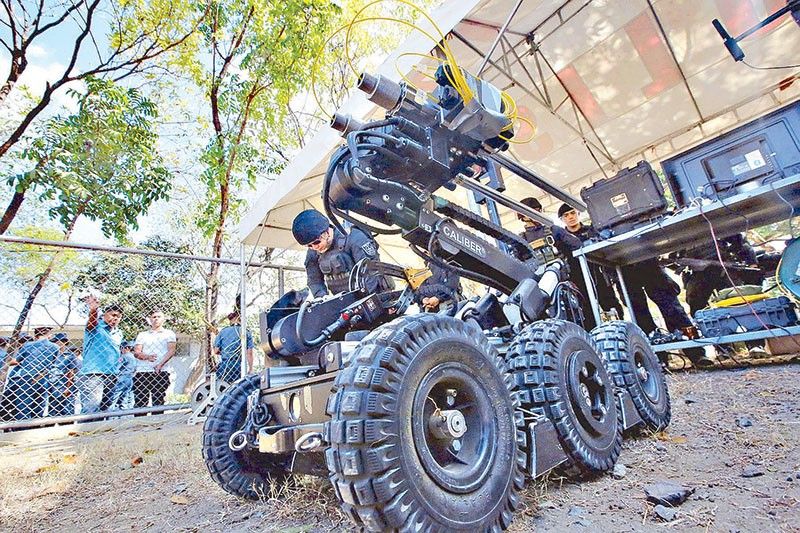Bomb threats hit Metro Manila, Luzon offices, schools

DOJ chief orders probe by NBI
MANILA, Philippines — Bomb threats sent through email and text messaging disrupted yesterday operations in at least seven government offices and two schools in Metro Manila, Bataan and Zambales.
The threats were carried out reportedly by an individual claiming to be a Japanese lawyer.
The same suspect was responsible for similar bomb threats on government establishments in September and October last year, police said.
“A person who introduced himself as Takahiro Karasawa, who claimed to be a Japanese lawyer, has been using the same email to send bomb threat messages,” Philippine National Police public information office chief Col. Jean Fajardo said.
In Quezon City, bomb threats were sent to the offices of the National Housing Authority, the Commission on Audit, Department of Environment and Natural Resources, the Philippine Competition Commission and Power Sector Assets and Liabilities Management (PSALM).
The Department of Science and Technology in Bicutan, Taguig and the Insurance Commission in Ermita, Manila also received bomb threats.
The National Capital Region Police Office also reported bomb threat incidents at Panghulo Elementary School in Malabon and Pasig Elementary School in Barangay San Nicolas.
The Department of Information and Communications Technology (DICT) also said it had received a bomb threat.
Fajardo said the establishments that received bomb threats were made to undergo precautionary measures like evacuating their occupants and subjecting the offices to thorough check by the Explosive Ordnance Disposal and K-9 unit.
At a briefing in Camp Bagong Diwa, PNP chief Benjamin Acorda Jr. emphasized the need for authorities to take threats seriously.
He said that efforts were underway – in coordination with international agencies – to track down the suspect. He said authorities were able to trace the origin of one of the emails but the individual involved denied sending the bomb threats.
“Unfortunately, it appears that the said person, according to him, his email was hacked or someone assumed his identity. So we are still looking for this perpetrator,” he said.
Acorda said that while the bomb threats turned out to be hoaxes, the PNP is responding “appropriately and accordingly” since it is better “than ignoring them totally.”
He said the motive of the perpetrator could be personal gain since the threats created “unnecessary disturbances,” especially as some schools were forced to suspend classes.
“I just hope that those persons responsible for this should know the consequences and they are causing so much trouble,” the PNP chief said.
Acorda’s briefing at Camp Bagong Diwa coincided with the US embassy’s turnover of donation of six EOD robots worth P45 million to the police force.
“This is a big thing because in responding to bomb threats and especially in suspicious packages, it’s very dangerous and these robots will definitely lessen the risk of our personnel,” he said.
When asked about measures to combat the spread of these threats, Acorda highlighted ongoing efforts involving international coordination and support from platforms like Google.
Justice Secretary Jesus Crispin Remulla said he has ordered the National Bureau of Investigation to investigate the matter.
According to the Department of Justice (DOJ), the bomb threats were sent by an unverified email account whose owner identified himself as Takahiro Karasawa.
Karasawa is supposedly a Japanese lawyer from a certain “Steadiness Law Office” and a “highly knowledgeable” bomb-maker, the DOJ said.
In the email, Karasawa said bombs would go off at major Philippine government agencies on Feb. 12 at around 3:34 p.m.
“There should be no place for pranks or spreading fear among our people. Let this be a warning to those behind this that we will not tolerate such acts and we will go after you with the full extent of the law,” Remulla said.
The National Capital Region Police Office said about eight institutions received bomb threats yesterday, of which five were government agencies and two were public schools.
The Cybercrime Investigation and Coordinating Center (CICC) also said they were investigating the source or sources of the bomb threats.
The CICC, together with the PNP and the management information systems personnel of the offices involved, recovered multiple emails sent to several people.
Lucia Tangi, CICC media relations officer, said the DICT was among the six agencies that received bomb threats, which turned out to be a hoax.
“We can confirm that one of them is DICT. We have to wait for the other agencies to confirm publicly,” Tangi told ICT reporters in a Viber group chat board message.
“There is no cause for alarm as this sender and email has been tagged as a hoax,” the CICC said in the statement.
“At about the same time, multiple government agencies in Seoul, Korea received the same email,” it added. “Last year the alleged sender sent the same bomb threat to several government agencies.”
The email originated from Japan, with the domain name registered locally in Japan.
“Efforts are on the way to request the Japanese government to investigate thoroughly and identify the sender,” the CICC said.
“As part of the emergency protocols, the affected government agencies were advised to practice their emergency evacuation procedures as part of the agency preparedness,” it added. — Neil Jayson Servallos, Daphne Galvez, Bella Cariaso, Rainier Allan Ronda
- Latest
- Trending






























